 Last Tuesday the North Carolina General Assembly heard an impassioned plea: strengthen the state’s ignition interlock laws to prevent drunk driving.
Last Tuesday the North Carolina General Assembly heard an impassioned plea: strengthen the state’s ignition interlock laws to prevent drunk driving.
The speakers included Mothers Against Drunk Driving (MADD) president Colleen Sheehey-Church and MADD North Carolina Executive Director LaRonda Scott.
The law that would do the job is North Carolina HB 877/SB 619. Known as an all-offender ignition interlock law, it would require all drunk drivers who are convicted with a blood alcohol concentration (BAC) of .08 or more to use an ignition interlock in their vehicle for a period. An ignition interlock, or car breathalyzer, prevents a vehicle from starting if the driver has been drinking.
Currently North Carolina’s law mandates interlocks for those convicted with a BAC of .15 or greater. The implication is that an .08 BAC is not serious enough to warrant the interlock. But a 160-pound man would have to drink four drinks inside of an hour to reach that .08. That’s a lot of alcohol, and a lot of impairment. Anyone driving at that level is a danger to everyone on the road.
Right now the .08 drunk driver is likely to get a suspended license and a fine. Neither of those does a good job preventing recidivism. In fact, more than half of suspended drivers ignore their suspensions and drive. Fines and even jail time don’t address the problem drinker who repeatedly makes the bad decision to drink and drive. Treatment is a valid and worthwhile option, but lapses occur. The ignition interlock is the only way to keep those drivers from driving drunk again and possibly injuring or killing someone – or themselves.
25 states now have all-offender ignition interlock laws, and one more will sign a similar bill into law this month. The tide is turning, and MADD is right about North Carolina’s need to catch that wave and pass HB 877/SB 619. Lives depend on it.
